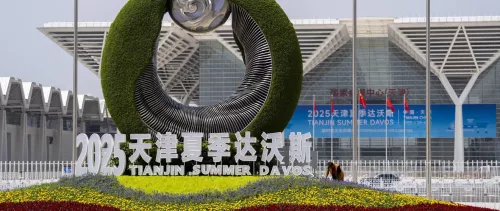
- The World Economic Forum has selected 56 emerging tech firms from around the globe to be its 2019 cohort of Technology Pioneers
- 25% are female-led and span countries including Mexico, South Africa and for the first time Saudi Arabia
- This year’s finalists are using tech in bold new ways, developing satellites to fight climate change, CRISPR for food security, compostable plastic inspired by oranges, and other innovations
- Read about the 2019 Technology Pioneers here
Dalian, China, 1 July 2019 – The World Economic Forum today unveils its 2019 Technology Pioneers: tech firms from around the world, shaping their industry and their region in new and exciting ways. The 2019 cohort was selected by a committee of 59 leading technology experts, investors and entrepreneurs.
“Our new tech pioneers are at the cutting edge of many industries, using their innovations to address serious issues around the world,” says Fulvia Montresor, Head of Technology Pioneers at the Forum. “This year’s pioneers know that technology is about more than innovation – it is also about application. This is why we believe they’ll shape the future.”
As part of their selection, all Technology Pioneers can participate in a two-year programme with the Forum, when they have the opportunity to collaborate with their emerging tech peers, engage with industry leaders and work with public and private experts around the world. The 2019 cohort is invited to participate at the Forum’s upcoming meeting, the 13th Annual Meeting of the New Champions, Dalian, People’s Republic of China, 1-3 July.
Of the 56 firms selected, 25% of them are female-led and they are drawn from a pool that stretches beyond the traditional tech hubs like Silicon Valley. This year’s group includes, among others: healthcare app DabaDoc from Morocco; Via Verde from Mexico facilitating vertical gardening; manufacturing-focused DataProphet from South Africa; and the first Technology Pioneer from Saudi Arabia, trucking and logistics innovator Homoola.
Countries represented are: China, Finland, Germany, Israel, Mexico, Morocco, the Netherlands, Republic of Korea, Saudi Arabia, South Africa, Singapore, Switzerland, the United Kingdom and the United States.
The Technology Pioneers are at the cutting edge of a wide range of industries that span agtech, smart cities, cleantech, supply chain, manufacturing, cybersecurity, autonomous vehicles, drones and others.
China’s Dorabot uses robots to create seamless delivery and logistics services. Also based in China, Alesca Life creates cloud-connected farms and farm digitization software to improve the efficiency of food production so that hotels, restaurants or even private homes can produce food in automated “cabinet farms” that use up to 25 times less water and land than traditional methods.
Another Technology Pioneer aiming to address food shortages, US-based Inari Agriculture, uses CRISPR gene-editing technology to produce healthier crops that require much less land and have a significantly lower impact on the environment. Using green technology in another way is Mexico’s Via Verde. This pioneer creates, installs and maintains vertical gardens to transform urban infrastructure into green spaces that generate oxygen, improve air quality, reduce urban heat islands and provide other social and psychological benefits to highly populated cities.
Leading the way in autonomous vehicles is the US company Perceptive Automata. They are combining behavioural science, neuroscience and computer vision for autonomous vehicles to understand how pedestrians, bikes and drivers communicate on the road beyond codified traffic laws. At the cutting edge of manufacturing, DataProphet in South Africa uses AI to improve quality and yield.
Other Technology Pioneers are leveraging technology to address social issues. One example is Israeli TIPA, a clean-tech innovator addressing the global plastics crisis with compostable plastics packaging. US-established Marinus Analyticsaddresses human trafficking by leveraging machine learning and artificial intelligence to empower law enforcement and government agencies to protect vulnerable communities.
The 2019 cohort of Technology Pioneers:
Africa
- DataProphet (South Africa) – artificial intelligence for manufacturing
Asia
- Alesca Life (China) – data-driven, indoor vertical farming and crop management solutions
- Coeo Labs (India) – meeting clinical needs in critical care
- Dorabot (China) – artificial intelligence-powered robotic solutions for logistics and beyond
- Eureka (Singapore) – an artificial intelligence platform for mobile operator and enterprise partnerships
- Guangzhishu Technology (China) – providing blockchain-based privacy-preserving computation solutions
- Holmusk (Singapore) – leveraging real-world data to address mental health issues globally
- Sky Labs (Korea) – developing a cardio tracker to identify arrhythmia, which is difficult to diagnose
- Tookitaki (Singapore) – artificial intelligence-powered regulatory compliance solutions for financial institutions
Europe
- Bitfury (the Netherlands) – developing and delivering cutting-edge blockchain hardware and software solutions
- Black Bear Carbon (the Netherlands) – bringing the circular economy to tires
- Callsign (UK) – revolutionizing how people digitally identify themselves
- Garrison (UK) – a unique technology providing secure internet access
- ICEYE (Finland) – satellite imaging for every square metre on Earth, every hour
- Luminance Technologies (UK) – an artificial intelligence platform for lawyers
- Open Mineral (Switzerland) – disrupting how base metal commodities are traded
- Photanol (the Netherlands) – making biodegradable plastic from CO2, which is only the beginning
- Volocopter (Germany) – certified multicopter offering urban air mobility services
Latin America
- Via Verde (Mexico) – creating resilient urban environments using vertical green gardens
MENA
- DabaDoc (Morocco) – transforming the patient-doctor relationship through networked care
- Homoola (Saudi Arabia) – bringing rideshare to the trucking industry
- MeMed Diagnostics (Israel) – translating immune system signals into simple diagnostic insights
- QED-it (Israel) – enterprise solutions for data privacy using zero-knowledge proofs
- TIPA (Israel) – developing and producing compostable flexible packaging
North America
- 7 Cups (USA) – technology to scale compassion, solving mental health challenges
- Airobotics (USA) – pioneers in autonomous robotics with aerial insights and analytics
- Airtable (USA) – empowering human creativity by democratizing software creation
- Arcadia Power (USA) – making clean energy an easy choice, for everyone
- BigID (USA) – helping organizations know their customers by knowing their data
- Bright Machines (USA) – bringing intelligence and automation to manufacturing
- CyberCube (USA) – cyber-risk analytics to grow insurance in a connected world
- Descartes Labs (USA) – building a cloud-based platform to digitize the physical world
- Drishti (USA) – extending human potential in increasingly automated factories
- Full Harvest (USA) – the first B2B marketplace for imperfect and surplus produce
- GHGSat (Canada) – satellite monitoring of emissions from industrial facilities
- goTenna (USA) – a leading mobile mesh networking platform
- ImpactVision (USA) – real-time food quality and safety decisions
- Inari Agriculture (USA) – from nature's diversity to better seeds
- LunaPBC (USA) – people-driven health discovery platform
- Marinus Analytics (USA) – artificial intelligence-based tools to help the vulnerable in the digital world
- Microvi (USA) – safe water, sustainable chemicals and a clean environment for all
- One Concern (USA) – artificial intelligence for natural disaster resilience
- Onshape (USA) – a cloud design platform that speeds up product development
- Openwater (USA) – changing the way people read and write their bodies and brains
- Perceptive Automata (USA) – human intuition for machines
- Quantela (USA) – providing a digital platform for smarter urban infrastructure decisions
- Relativity Space (USA) – 3D-printed rockets to build the future of humanity in space
- Remitly (USA) – digital remittance services helping immigrants send money overseas
- Rigetti Computing (USA) – on a mission to build the world's most powerful computers
- Shape Security (USA) – protecting the Global 2000 from bot attacks
- Skuchain (USA) – empowering enterprises to grow their global trade with blockchain
- Spring Health (USA) – a comprehensive mental health solution for employers
- Starsky Robotics (USA) – bringing driverless trucks to the market
- Trackonomy (USA) – powering end-to-end visibility and control across global supply chains
- Truepic (USA) – restoring trust to digital photos and videos
- Vineti (USA) – creating essential software for personalized therapies
About the Technology Pioneers
The World Economic Forum believes that innovation is critical to the future well-being of society and to driving economic growth. Launched in 2000, the Technology Pioneer community comprises early to growth-stage companies from around the world that are involved in the design, development and deployment of new technologies and innovations, and are poised to make a significant impact on business and society.
The Forum recognizes a limited number of companies each year as Technology Pioneers and incorporates them into its initiatives, activities and events, where they bring cutting-edge insights and novel perspectives to world-critical discussions. Companies selected in the past include: Airbnb, Bloom Energy, bluebird bio, Cyberdyne, Editas Medicine, Foundation Medicine, Google, Kaggle, Kickstarter, Mozilla, Palantir Technologies, Proteus Digital Health, Scribd, Spotify, Twitter and Wikimedia.


